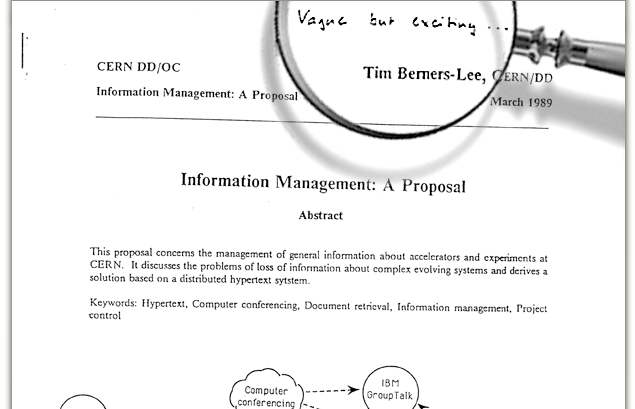The WWW inventor wants to reinvent the web
Father of the web Sir Tim Berners-Lee has launched the “Contract for the Web” initiative to rally the global community to revamp the web for the public good.
March 14, 2019

Father of the web Sir Tim Berners-Lee has launched the “Contract for the Web” initiative to rally the global community to revamp the web for the public good.
30 years after he proposed an “information management system” (pictured) while being a scientist at CERN, Sir Tim Berners-Lee believes that he could stand no longer what the web has become of lately. In 2018 Berners-Lee told the Vanity Fair magazine that he was “devastated” by the state of distortion of his creation. As a result, on the 30th birthday of the WWW, he decided to use his influence to bring the web back on the track he envisioned: it should be recognised as a human right and be built for the public good. “If we give up on building a better web now, then the web will not have failed us. We will have failed the web,” Berners-Lee said.
According to Berners-Lee, the dysfunction of the web in recent years has mainly been manifested in three ways:
“1. Deliberate, malicious intent, such as state-sponsored hacking and attacks, criminal behaviour, and online harassment.
“2. System design that creates perverse incentives where user value is sacrificed, such as ad-based revenue models that commercially reward clickbait and the viral spread of misinformation.
“3. Unintended negative consequences of benevolent design, such as the outraged and polarised tone and quality of online discourse.”
To counter these dysfunctional behaviours, the non-profit World Wide Web Foundation (or “Web Foundation”) led by Berners-Lee is launching a civil society initiative, “Contract for the Web”, that calls out to governments, businesses, and private individuals, to pledge their commitments to a better future of the web.
It has different requirements for the three types of constituencies.
It demands governments to ensure everyone can connect to the internet; keep all of the internet available, all of the time; and respect people’s fundamental right to privacy.
It asks businesses to make the internet affordable and accessible to everyone; respect consumers’ privacy and personal data; and develop technologies that support the best in humanity and challenge the worst.
It challenges individuals to hold the governments and businesses accountable; be creators and collaborators on the web; build strong communities that respect civil discourse and human dignity; and fight for the web so the web remains open and a global public resource for people everywhere, now and in the future.
Under these principles, a group of people are working on the specific commitments in each area. The group is open to input from all (institutions and individuals alike) who share the vision, and the results of the work are expected later this year.
Signatories so far include some of the world’s biggest internet companies (e.g. Google, Microsoft, Facebook), other non-profit organisations (e.g. W3C), private citizens and celebrities and former and current politicians (e.g. Sir Richard Branson, Gordon and Sarah Brown), telecom operators (Telefonica), and governments (Die Bundesregierung).
The level of endorsement and commitment the initiative may ultimately garner is yet to be seen and will depend on the specifics being developed. Some governments may be hesitant towards the demand for allowing its citizens to access all the information on the internet without filtering, while others may feel they would prefer to have access to some of the people’s private data to strengthen public security. The demands for businesses may be seen as threatening the very livelihood of some companies whose business models have built on monetising user data.
Sir Tim Berners-Lee never made wealth out of his invention, but his transformational role has been well recognised. Stephen Fry once identified Sir Tim as one of the two living Englishmen that have had the most profound impact on people’s lives worldwide, the other being Apple’s Chief Design Officer Jony Ive.
About the Author(s)
You May Also Like








.png?width=300&auto=webp&quality=80&disable=upscale)


_1.jpg?width=300&auto=webp&quality=80&disable=upscale)


.png?width=800&auto=webp&quality=80&disable=upscale)